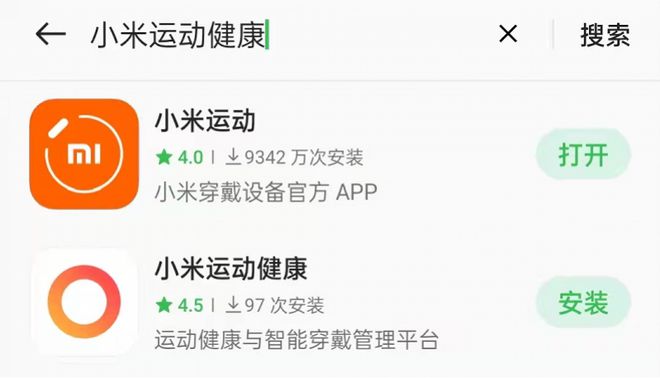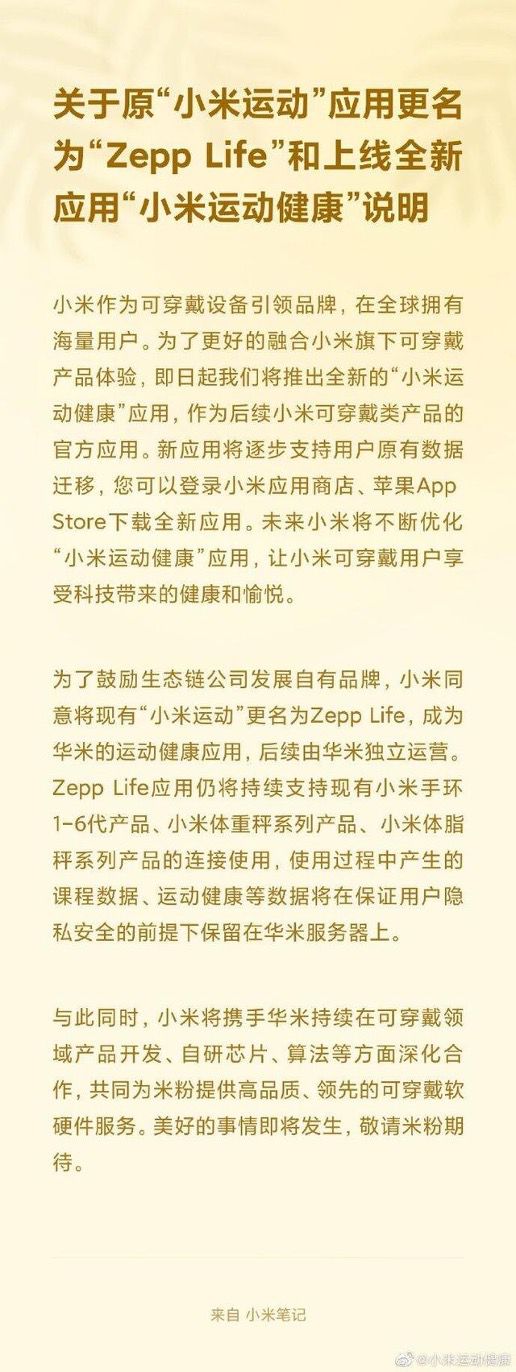Huami’s "going to Xiaomi" accelerated, and Xiaomi Sports App was renamed
On March 16th, Xiaomi officially announced that the original "Xiaomi Sports" application was renamed as "Zepp Life", which became the sports health application of Huami, and was subsequently operated independently by Huami. At the same time, Xiaomi launched a brand-new application "Xiaomi Sports Health" as the official application of subsequent Xiaomi wearable products, and the new application will gradually support users’ original data migration.


The announcement also shows that zepp Life application will continue to support the connection and use of existing mi band 1st-6th generation products, Xiaomi weighing scale series products and Xiaomi body fat scale series products, and the course data, sports health and other data generated during the use process will be kept on Huami server on the premise of ensuring the privacy and safety of users.
At the same time, Xiaomi will continue to deepen cooperation with Huami in product development, self-developed chips and algorithms in the wearable field, and jointly provide high-quality and leading wearable software and hardware services for rice noodles.
It is worth noting that the renaming of Xiaomi Sports APP is only the epitome of Xiaomi’s eco-chain enterprises in the eyes of the industry, because besides Huami, Roborock, Yunmi and No.9 Company have started to "stand on their own feet", get rid of the embarrassing position of being a millet agent and build their own product lines.
It is understood that as early as 2014, Xiaomi and Huami jointly launched the first generation of mi band. From 2015 to 2016, Xiaomi products contributed 97.1% and 92.1% of the current income to Huami.
Also in 2015, Huami started its "Demining Plan", released its own brand Amazfit, and then acquired the smart wearable brand Zepp in 2018, and successively launched the Huangshan series self-developed wearable device chip and the open platform Zepp OS, which were installed on smart wearable products such as Amazfit GT3.
The financial report of Huami Technology in the third quarter of 2021 shows that the shipment of its own brand increased by 89% year-on-year, while the shipment of wearable products such as OEM mi band decreased by 45.3%.
Although the shipments of private brands have increased significantly, the sequelae of "de-rice" have also followed. The financial report shows that in the third quarter of 2021, Huami Technology’s revenue was 1.6 billion yuan, down 28.1% year-on-year; Product shipments dropped from 15.9 million units in the same period last year to 9.9 million units, down 37.7% year-on-year; Net profit decreased from 81.1 million yuan in the same period last year to 49.3 million yuan, a year-on-year decrease of 39.2%.
Huang Wang, the founder, chairman and CEO of Huami, once said in a telephone conference that the revenue and profit in the third quarter dropped significantly, mainly due to the 45.3% year-on-year decline in shipments of wearable products such as mi band, which was contracted by Huami Technology.
As a star of science and technology innovation board, Roborock is also a member of "going to Xiaomi". In 2016, Roborock’s first intelligent sweeping robot product was customized for Xiaomi. A year later, Roborock began to launch independent brands such as "Stone" and "Xiaowa" series. During 2016 -2020, the proportion of private brand sales in Roborock was 0.9.64%, 49.83%, 66% and 90.72% respectively. In the first half of 2021, the sales proportion of Roborock’s own brand products has increased to 98.23%.
Roborock’s identity after "Demihua" will also be transformed into a new rival of Xiaomi in the field of car making. It is reported that Roborock has started the smart electric vehicle project Luotuo Automobile by the end of 2020, and completed the financing of 100 million US dollars by the end of 2021. Tencent and Sequoia both participated in the investment.
It is worth noting that similar "reincarnation" has also been staged in Xiaomi ecological chain enterprises such as No.9 Company and Yunmi. Even Company No.9 explicitly mentioned in science and technology innovation board’s prospectus that "the company does not belong to the typical ecological chain enterprise defined by Xiaomi."
Some industry analysts said that the eco-chain enterprises such as Sushi Technology, Yilai Intelligent and Fun Sleep Technology, which will be listed next, will still repeat the practices of their predecessors and resolutely "go to Xiaomi". At the beginning of the venture, Xiaomi’s strong supply chain integration ability and brand power can indeed provide a huge market and reputation endorsement for enterprises; However, if the enterprise has reached the stage of development and growth, and still relies too much on the ecological chain of Xiaomi, it will face the risks of reducing procurement and order quantity. If it wants to gain a bigger market or impact a higher-end market, it will tear off the label of Xiaomi to accommodate more labels and possibilities.
Written by Southern Reporter Chen Peijun